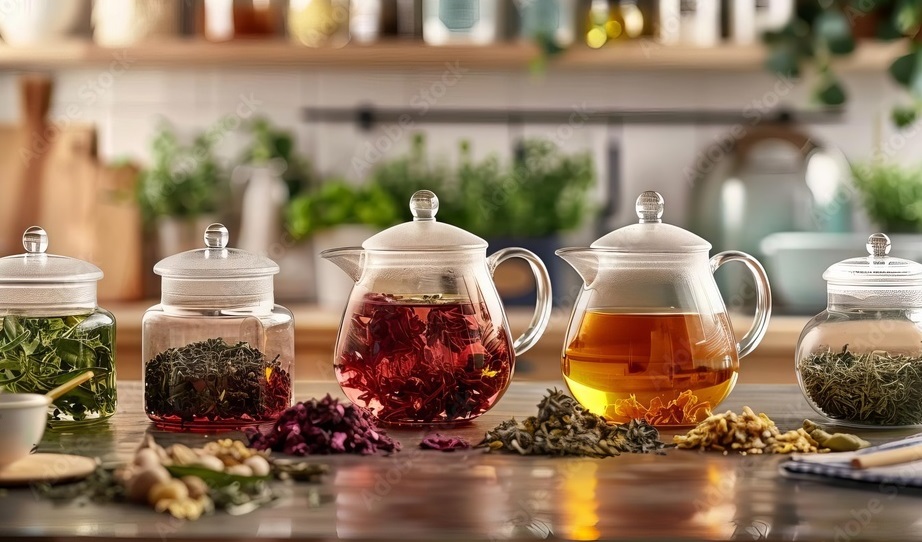In recent years, herbal teas have gained popularity not just for their refreshing taste but also for their perceived health benefits. Many people turn to herbal teas as a natural remedy for various ailments or simply as a soothing beverage. However, what often goes overlooked is the potential interaction between these herbal teas and prescribed medications. While herbal teas are generally considered safe, they contain active compounds that can interfere with medications, altering their effectiveness or causing adverse effects.
10 Herbal Teas and Their Potential Effects
Here are popular herbal teas and their potential interactions with medications:
1. St. John’s Wort Tea
- Herbal Profile: Known for its antidepressant properties, St. John’s Wort contains hypericin and hyperforin.
- Interaction: Decreases the effectiveness of antidepressants, birth control pills, and some heart medications by accelerating their breakdown in the liver.
2. Ginseng Tea
- Herbal Profile: Ginseng is valued for its adaptogenic properties and is used to improve energy and cognition.
- Interaction: Interferes with blood-thinning medications like warfarin, potentially increasing the risk of bleeding.
3. Ginkgo Biloba Tea
- Herbal Profile: Ginkgo Biloba is touted for enhancing memory and cognitive function.
- Interaction: Increases the risk of bleeding when combined with blood-thinning medications such as aspirin or warfarin.
4. Licorice Root Tea
- Herbal Profile: Licorice root is sweet and often used in teas for its soothing properties.
- Interaction: Can lead to potassium depletion and may interfere with medications for high blood pressure, diabetes, and heart conditions.
5. Echinacea Tea
- Herbal Profile: Echinacea is believed to support immune function and reduce the severity of cold symptoms.
- Interaction: Can interact with immunosuppressants and medications processed by the liver.
6. Chamomile Tea
- Herbal Profile: Chamomile is known for its calming effects and is used to promote relaxation and sleep.
- Interaction: Enhances the effects of sedatives and medications for anxiety, potentially leading to excessive drowsiness.
7. Peppermint Tea
- Herbal Profile: Peppermint is refreshing and commonly used to aid digestion and relieve nausea.
- Interaction: Can affect medications metabolized by the liver, potentially altering their effectiveness.
8. Hibiscus Tea
- Herbal Profile: Hibiscus tea is rich in antioxidants and is enjoyed for its tart flavor.
- Interaction: May lower blood pressure, which can interfere with medications prescribed for hypertension.
9. Valerian Root Tea
- Herbal Profile: Valerian root is used as a sleep aid and to alleviate symptoms of anxiety.
- Interaction: Enhances the effects of sedatives and medications for insomnia, potentially causing excessive drowsiness.
10. Kava Tea
- Herbal Profile: Kava is known for its relaxing effects and is used to reduce anxiety and promote sleep.
- Interaction: Can interact with medications processed by the liver, potentially leading to liver damage in high doses.
Understanding the Risks
The potential interactions between herbal teas and medications stem from the active compounds present in the herbs. These compounds can affect how medications are metabolized in the body, leading to either reduced effectiveness or increased side effects. For example, some herbal teas may interfere with liver enzymes responsible for breaking down medications, altering their blood levels.
Importance of Communication with Healthcare Providers
Given the complexity of interactions, it is crucial to inform your healthcare provider about any herbal teas you consume regularly, especially if you are taking prescription medications. Your doctor or pharmacist can provide personalized advice based on your medical history and the specific medications you are taking.
Tips for Safe Consumption
- Research and Consultation: Research herbal teas thoroughly and consult healthcare professionals before incorporating them into your routine, especially if you have underlying health conditions or are pregnant.
- Monitoring: Pay attention to any changes in your health or the effectiveness of your medications when starting herbal teas. Report any concerns to your healthcare provider promptly.
- Quality and Source: Purchase herbal teas from reputable sources to ensure quality and avoid contamination with harmful substances.
Conclusion:
While herbal teas offer a natural approach to wellness, their potential interactions with medications underscore the importance of informed and cautious consumption. By understanding these interactions and maintaining open communication with healthcare providers, you can enjoy the benefits of herbal teas safely and effectively. Always prioritize your health and well-being by seeking professional guidance when in doubt about combining herbal remedies with prescribed medications.
Also Read:
